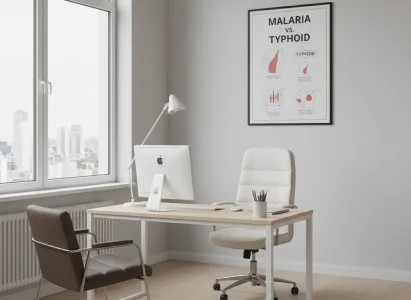
Myth: "It’s Just Typhoid, Not Malaria"
The Fact: In Nigeria, malaria and typhoid are often confused because they share symptoms such as high fever and headaches. However, they are distinct diseases requiring distinct treatments.The Risk: Treating malaria with typhoid antibiotics (or vice versa) allows the real parasite to multiply, often leading to severe complications. The only way to know the truth is a Rapid Diagnostic Test (RDT) or microscopy, not a guess based on how you "feel."
Myth: "Agbo is Better Than Hospital Drugs"
The Fact: Herbal remedies (Agbo) are deeply rooted in Nigerian culture, and while some plants have medicinal properties, the dosages are rarely standardised.The Risk: Relying solely on herbal mixtures for a child with a high fever can be dangerous. Verified antimalarial medications (ACTs) have precise dosing to clear the parasite completely. "Natural" does not always mean "strong enough" to stop a killer disease.
Myth: "I Don’t Need a Net in the Dry Season"
The Fact: Mosquitoes may be more abundant during the rains, but they do not disappear when it stops raining. Anopheles mosquitoes, the ones that carry malaria, can breed in tiny puddles or household water containers year-round.The Risk: Stopping prevention measures during the dry season creates a "security gap" that leaves families vulnerable. Malaria exists 365 days a year.
The Truth Saves Lives
Knowing the difference between a myth and a medical fact is the first line of defence. Before buying drugs from a chemist or mixing herbs, ask: Have I tested? Do I know what this is?If you have symptoms, visit a primary health centre. Trusting a test result over a rumour is the single most effective way to protect your family’s future.



